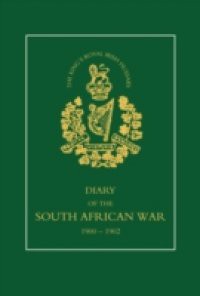This diary is written from notes made daily by the author when he was signal sergeant to Lieutenant-Colonel P.L.Clowes, who commanded the regiment during the war until October 1901, and afterwards from notes made when he was a squadron sergeant-major and Orderly-Room Sergeant (ORS). It also incorporates the diary of C Squadron, when detached from the regiment, written by its OC, Major A.Henderson, and that of A Squadron during the time it was with Colonel Pulteney's Column, written by Major F.W.Mussenden, squadron OC. It begins with a short, background history of the regiment from its formation in 1693 to 1903 when it was in Aldershot.On 26th December 1899 the regiment was at the Curragh when mobilization orders were received and on 13th February 1900 the regiment embarked at Queenstown (Cobh) for S Africa, part of the 4th Cavalry Brigade with 7th Dragoon Guards and 17th Lancers. Embarkation strength was 19 officers, 586 WOs, NCOs and men and 487 horses (someone was going to have to walk!). The complete nominal roll of those embarking is given, listed by squadrons.The diary begins on 13th Feb followed by daily entries describing the voyage during which eleven horses and one crew member died; it ended at Cape Town on 10th March. It is on this daily entry basis that the progress of the regiment is described, in action, on the move, in camp with all the problems of campaigning on the veldt - sickness, food and water shortage, supplies and other details. Casualties are noted by name and rank and number as they occurred, each draft arriving is listed by number, rank and name and this aspect is a godsend to medallists and genealogists. We meet officers who will have a part to play in the next war - French, Plumer, Pulteney, Hamilton and others. The memorial in St Patrick's Cathedral, Dublin, lists three officers and 51 other ranks dead; the description of the unveiling ceremony as published in the Dublin Mail andEvening Mail is reproduced at the end of the book.

